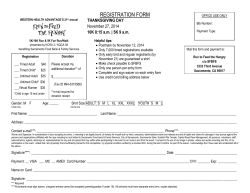
Timed Multiparty Session Types
ABCD@ London, 20 April 2015 Timed Multiparty Session Types Laura Bocchi, Weizhen Yang, Nobuko Yoshida CONCUR 2014 The problem (1) • Independent programs realise global tasks through network interactions • Participants need to agree on protocol, on data semantics … Multiparty Session Types [Honda et al, Bettini et al, 2008] Local Type (Aggregator) Global Type project Local Type (Master) Local Type type check Process (Worker) • Efficient, local verification of global properties (session fidelity & progress) The problem (2) • Web Services: “Reconnect no more than twice every four minutes …” [Twitter Streaming API] • Sensor Networks (on busy waiting): “Main sources of energy inefficency in Sensor Networks are collisions and listening on idle channels” [Ye, Heidemann & Estrin, 2002] • Protocol specification: deadlines, timeouts, repeated constraints (resets), … x x=0 y z y := 0 y≤W Delays (in milliseconds) L = 400 (latency) W = 300,000 (sampling time) D = 2000 (decision time) The problem (2) • Web Services: “Reconnect no more than twice every four minutes …” [Twitter Streaming API] • Sensor Networks (on busy waiting): “Main sources of energy inefficency in Sensor Networks are collisions and listening on idle channels” [Ye, Heidemann & Estrin, 2002] • Protocol specification: deadlines, timeouts, repeated constraints (resets), … x x=0 x = 2L+W, x := 0 y z L ≤ y < L+1, y := 0 y≤W 0≤ x≤D x := 0 Delays (in milliseconds) L = 400 (latency) W = 300,000 (sampling time) D = 2000 (decision time) x, y, z := 0 3L+W+D ≤ z y = 2L+D 3L+W+D ≤ z y = 2L+D Communicating Timed Automata (CTAs) • Timed automata [Alur & Dill ‘94]: set of clocks, guarded transitions, resets • CTA [Krcal & Yi ‘06]: network of timed automata asynchronously communicating on unbounded channels and synchronizing over time actions • In general it is hard to verify properties such as reachability • upper bound on channels [S. Akshay et al. FSTTCS’94] • some topologies e.g., polyforests [Clemente et al. FOSSACS’13] Overview time Communicating Timed Automata Multiparty Session Types • Verification of real-time interactions with Multiparty Session Types • time-error freedom: interactions are punctual • time-progress: a deadlock state is not reachable and time can diverge • Correspondence between global types and Communicating Finite States Machines (CFSMs) [Denielou & Yoshida, ICALP’13] • Decidable conditions for progress and liveness for CTAs Timed Global Types Clock constraint Resets Transitions & satisfiability of ready actions Specified semantics: 15 1.99 Transitions & satisfiability of ready actions Communication actions at times that violate the constraints are not allowed Specified semantics: ✘ 15 1.99 Transitions & satisfiability of ready actions Communication actions at times that violate the constraints are not allowed Specified semantics: ✘ ✘ 15 1.99 Time actions that make constraints of some ready action unsatisfiable are not allowed Transitions & satisfiability of ready actions Communication actions at times that violate the constraints are not allowed Specified semantics: ✘ ✘ 15 1.99 ✔ Time actions that make constraints of some ready action unsatisfiable are not allowed A (very) simple timed calculus • Calculi with time: inspired by CTAs [Saeedloei et al ‘13], with timeouts [Laneve et al. 05, Berger et al. ’07, Lopez et al. ‘12], for SOC [Lapadula et al. ’07] … • We use a very simple calculus Process P Type T Type-safety • We give a type system for timed processes based on judgments: An action has been executed at a time that violates the specification Time progress • Time-progress (for well-typed timed processes): • each reachable state is not a deadlock state (it is final or it can reduce) • time can diverge (the only possible way forward must not be Zeno) • Well-typedness of timed processes does not guarantee progress in general • We give two decidable sufficient conditions: • Feasibility • Wait-freedom Feasbility A constraint in a timed global type may not be satisfiable ✘ ✔ ✔ Feasibility: for each partial execution allowed by a specification there is a correct complete one [Apt, Francez & Katz, POPL’87] Wait-freedom Some well-typed distributed implementation of feasible timed types may lead to inconsistent views of the timing of actions by different participants. The receiver may not find the message ready when reading the channel P can send the message only after 6 time units elapse Q needs to receive now … but the message is not ready! Wait-freedom: The constraint of each receive action must not admit, as a solution, a time which is earlier than some solution of the corresponding send action. Progress for t-MPSTs • Well-typed processes of feasible and wait-free MPSTs enjoy global progress (if their untimed counter-part does so) • processes in single sessions (e.g., [Honda et al. POPL’08]) • processes in interleaved sessions (e.g., [Bettini et al. CONCUR’08]) where session initiations do not occur after delays ✘ ✔ Correspondence with CTAs • In the untimed setting [Denielou & Yoshida, ICALP’13] gives correspondence between global types, and basic and multiparty compatible CFSMs • In the timed setting we give correspondence between timed global types, and basic and multiparty compatible CTAs with a specified semantics • A CTA that is basic, multiparty compatible, with specified semantics and corresponds to a feasible timed global type ensures • progress: each reachable state is non-deadlock and allows time divergence • liveness: a final state can be reached from all reachable states Conclusion & future work • Timed Multiparty Session Types & typing system for timed processes ensuring CTAs MPSTs time-error freedom • Progress of well-typed implementations of feasible and wait-free types • Feasibility and wait-freedom decidable for infinite satisfiable timed global types • Implementation in [Neykova et al. BEAT’14] • Future work: can we extend timed MPSTs with parallel operation? • Correspondence between CTAs and MPSTs • A class of CTAs enjoying progress and liveness (based on feasibility) • We used CTAs as types. Progress of CTAs only requires feasibility • Recently, we convert from CTAs to timed MPSTs Questions?
© Copyright 2025









